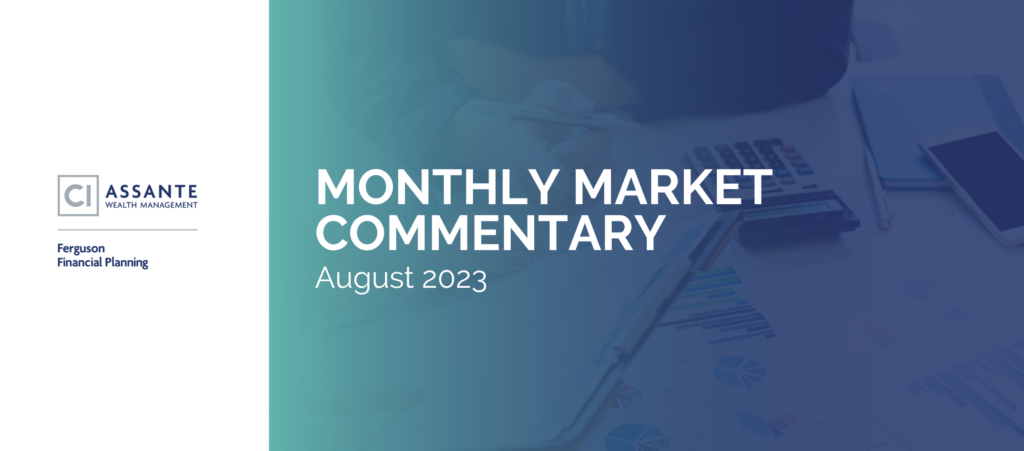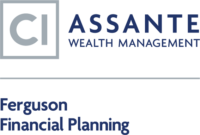August 2023 Market Commentary

Investors held onto their recent gains in July.
Read the July 2023 Market Commentary here.
Here’s a summary of the events that steered the markets.
Monthly market developments
- U.S., Canadian and global equities had another positive month with the S&P 500 Index in particular notching its fifth straight month of gains. Most sectors contributed including banks, tech and metals.
- In bond markets, U.S. and Canadian yields remained stable as a result of welcoming inflation data.
- After dropping in Q1 and Q2, oil prices rose and ended July above US$80 per barrel as production cuts by Saudi Arabia and OPEC over the past few months started to have an impact on global supplies.
- Job creation in the U.S. and Canada continued to be strong. However, the Canadian unemployment rate ticked up, reflecting a surge in job seekers while the U.S. rate was stable. Canadian wage growth also slowed. Both the Fed and Bank of Canada monitor job and wage growth for signs of inflation.
- In an effort to bolster U.S. and Chinese trade relations, Treasury Secretary Janet Yellen visited China to meet with government officials. Despite news stories about economic decoupling since COVID-19, the interdependence of the two economies is too substantial for a full-scale decoupling to occur.
- The European Central Bank hiked rates again, by 0.25% to 3.75%, while the Bank of Japan made a policy tweak. It maintained the 0% target for its 10-year bond yield but expanded the allowed range from 0.5% to 1%. The Bank of Japan also increased its 2023 inflation forecast from 1.8% to 2.5%.
- U.S. CPI was up 0.2%, slightly less than expected, bringing core inflation, which excludes food and energy prices, to 4.8%. This was a positive outcome given the sensitivity across asset classes to the risk of higher interest rates should inflation stay too high. Following a pause in June, the Fed hiked its target rate by another 0.25% to 5.25-5.5% and stated it would continue to monitor economic data.
- Canadian inflation cooled to 2.8 %, back within the Bank of Canada’s 1-3% range. This was largely due to lower gasoline prices, although food and rent remain very high. The Bank of Canada raised interest rates to 5%, the highest since 2001. Its decision was motivated by a stronger than expected economy, resilient job market and the ongoing strength of consumer demand.
How does this affect my investments?
While there may be some minor hikes still to come, interest rates are likely near their peak, provided inflation does not reverse course. The question then becomes just how long rates will be held at historically high levels. Inflation is expected to remain above the Bank of Canada’s 2% target until 2025, indicating there will likely be no immediate need for rate cuts in Canada. If the delayed effects of higher rates start affecting the economy, it may be necessary to lower rates sooner than currently anticipated.
Regardless of where we are in the market cycle, it is important to take a disciplined approach to investing and stay focused on your long-term goals. This strategy helps you keep your emotions out of investing, typically buying high and selling low like many investors do. Ongoing monitoring and reviewing of your portfolio also ensures it remains on track. Diversifying investments reduces risk as well.
We can help
We are here to help you meet your investment goals and we welcome your questions. We work with business professionals, executives, and families to grow and protect their wealth using our Wealth Plan formula. To discuss our approach and if it is the right fit for you, we invite you to schedule a no-obligation discovery consultation.
Disclaimers
The information in this letter is derived from various sources, including CI Global Asset Management, U.S. Bureau of Labor Statistics, Globe and Mail, Advisor.ca, Reuters, LinkedIn News, Daily Mail, CNN, FX Street, CNBC, the Wall Street Journal, Bloomberg, the Federal Reserve, Bank of Canada and Statistics Canada as at various dates. This material is provided for general information and is subject to change without notice. Every effort has been made to compile this material from reliable sources and reasonable steps have been taken to ensure their accuracy. Market conditions may change which may impact the information contained in this document. Before acting on any of the above, please contact me for individual financial advice based on your personal circumstances.
ACM advisors will need to the include CIPF/IIROC disclosure in the email (already disclosed on ACM letterhead): Assante Capital Management Ltd. is a Member of the Canadian Investor Protection Fund and Investment Industry Regulatory Organization of Canada.

